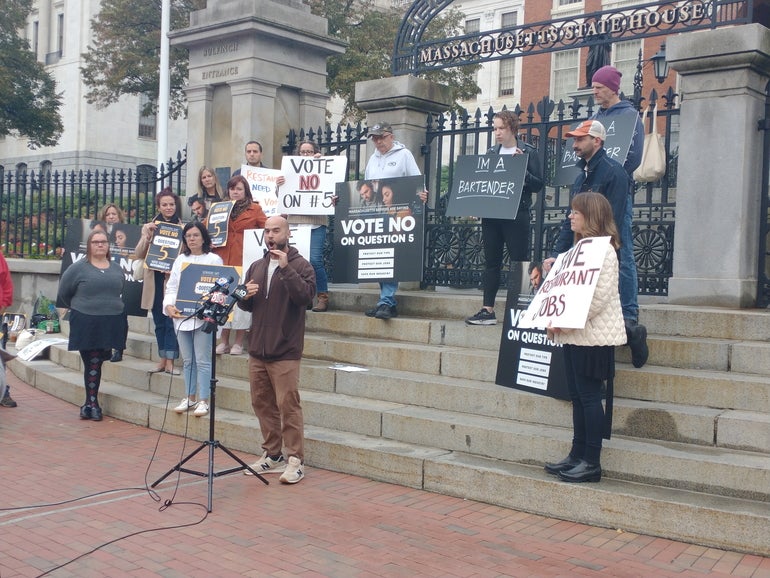The campaign opposed to phasing out the current tipped-wage structure and increasing the pay for waiters and bartenders to the minimum wage declared victory in the fight over Question 5 around 11 p.m. Tuesday night, with about 40 percent of votes counted.
According to the Associated Press vote tally at 11:40 p.m., about 65 percent of voters had opposed the question, and 35 percent supported it. About 52 percent of votes had been counted.
“This is a testament to the hard working servers and bartenders that volunteered for the campaign to say we don’t want this. Thousands of servers came together to educate the voters about the detrimental impacts of this question. This is a great night for the hospitality industry,” said Steve Clark, president of the Massachusetts Restaurant Association, after No on 5 declared victory.
The One Fair Wage campaign led the push to nix the subminimum wage structure for restaurant employees and other hospitality workers, arguing the policy to bring them up to the state’s full minimum wage would crack down on issues like wage theft and sexual harassment. Tipped employees earn an hourly wage of $6.75. If they don’t earn enough in tips to reach $15 an hour, employers must make up the difference.
A controversial provision in the measure would have also allowed restaurant owners to administer a tip pool among tipped employees and back-of-the-house workers who don’t interact with customers.
The Massachusetts Restaurant Association and the Committee to Protect Tips led the opposition, warning the measure would devastate the restaurant sector and ultimately harm the workers OFW sought to help. Critics argued the increase in labor costs would drastically raise menu prices, trigger layoffs, and force restaurants to close or scale back their service.
The Yes on 5 campaign did not immediately respond to request for comment Tuesday night.
OFW boasted endorsements from Attorney General Andrea Campbell and former U.S. Secretary of State Hillary Clinton. Opponents amassed support from Gov. Maura Healey and Lt. Gov. Kim Driscoll, plus a bevy of state lawmakers and Boston city councilors who contend workers would earn more by keeping the tipped-wage structure intact.
“As former waitresses who know what it’s like to rely on tips, we know how hard our servers work and believe they deserve to be well-compensated for all they do,” Healey and Driscoll said in the campaign’s final days. “It’s why we are joining with servers across the state in opposing Question 5 because we believe it will lower their compensation, not raise it.”
The question’s policies would have been phased in over five years. Tipped workers would have earned 64 percent of the minimum wage in 2025, followed by 73 percent in 2026, 82 percent in 2027, 91 percent in 2028 and 100 percent by 2029.
Lawmakers didn’t take any action on the measure earlier this year but recommended the Legislature work with Campbell to tackle wage theft, sexual harassment and assault in tipped-wage industries.

